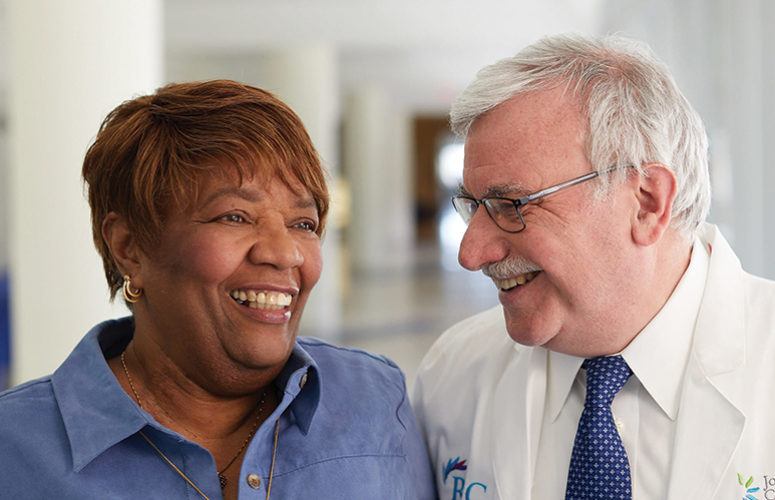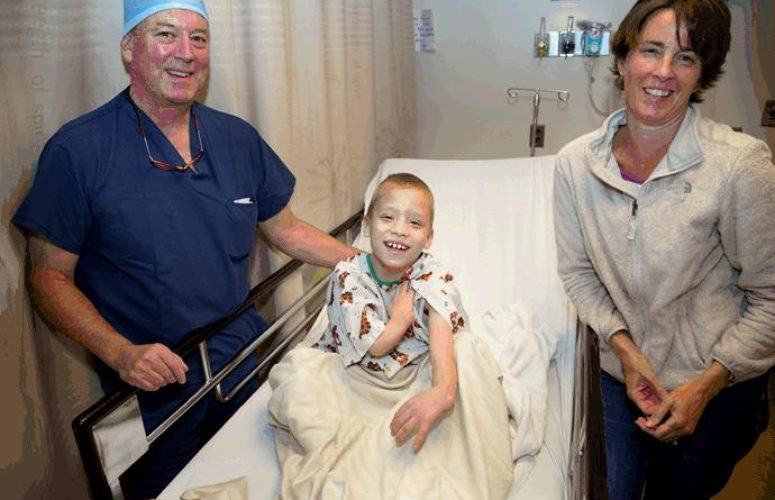
Breast Cancer Care: A New Frontier
From surgical approaches to genomics and cutting-edge clinical trials, breast cancer care has entered a new realm – with demonstrable, order-of-magnitude improvements when compared to even a decade ago.
By George N. Saliba, Managing Editor On Oct 9, 2018While cancer care experts in certain cases recommend removing both of a woman’s breasts, advanced nipple-sparing mastectomies may permit surgeons to do so via access points such as the natural creases underneath women’s breasts. As the breasts’ envelopes are preserved in this way, interior breast matter is removed, and surgeons then – in effect – may insert implants, creating breasts which may appear to be entirely natural.
“Having mastectomies, whether it is for risk reduction or for a cancer, is a lot easier when [women] look in the mirror [afterwards] and can recognize themselves – and not feel debilitated or in severe pain,” explains Manpreet Kohli, MD, FACS, breast surgeon and cancer liasion physician, Barnabas Health Medical Group, affiliated with Monmouth Medical Center, Monmouth Medical South and Community Medical Center.
She adds, “The results after a lumpectomy are [also] great, because we … reshape the breast in an oncologically safe fashion so that there is still a nice, normal contour to the breast. We have hidden scar approaches for lumpectomies, and we even have hidden scar approaches for mastectomies …”
It is not merely a wide range of these and other surgical techniques which have rapidly advanced in this breast cancer care era, but staggering progress has also been achieved in the sphere of genomics and biopharmaceuticals, for example.
“If a woman is going to get breast cancer, I say this is the best time, because we know so much; we really individualize their treatment,” Rebecca C. Yang, MD, FACS, medical director, breast surgery, at Overlook Medical Center (which is part of the Atlantic Health System), explains.
Yet, October is breast cancer awareness month, and Melissa Pilewskie, MD, assistant attending in the department of surgery at Memorial Sloan Kettering Cancer Center tells New Jersey Business, “While we do a good job [regarding breast screening] in this country, we are still not great at making sure that everybody has appropriate screening. Women should have conversations with their physicians about any risk factors, reviewing their family history, to see if they meet criteria for increased screening or, potentially, genetic testing. A lot of data coming out shows that we underutilize increased surveillance among women at very high risk. It is just an important reminder … that women should have this conversation with their physicians.” Of note, men too may develop breast cancer, although it is much less common.
A Vastly Complex Landscape
Diagnostic testing – 3D mammograms, ultrasounds, MRIs and biopsies, for example – lead people toward an intricate path for breast cancer treatment. In part revealing breast cancer’s vast complexity, Memorial Sloan Kettering’s Pilewskie, says, “There is what is called the Watson initiative, where IBM Watson is developing programs [in which] you can plug in patient information, and a computer will then provide a [treatment] recommendation. We at Sloan Kettering are the team of physicians who are behind this.”
She says that because medicine evolves so quickly, it is challenging to train the computer to “stay on top of that, in real time.” She adds, “It will always be a little bit behind. And the one thing I have noticed is that [the computer] is fine for what we would consider ‘bread-and-butter cases’ … [but] when we take multiple reports of surgery, when we are looking at margins, and the size of a nodal metastasis, the patient’s age, and how well she could tolerate a procedure – all of that is hard to build into a computer system. Once the case gets complicated, the result is: This is something that needs to be discussed through the multi-disciplinary conference with a group of humans who can discuss the pros and cons of different approaches.”
Stanley E. Waintraub, MD, FACP, chief of hematology and co-chief of breast oncology, John Theurer Cancer Center at Hackensack University Medical Center (an institution which is a member of the Hackensack Meridian Health network), asserts, “Super-specialization is so important. You can’t keep up [as a doctor] if you are doing melanoma, breast cancer, lymphoma, leukemia, ovarian cancer. It is impossible. The information is coming at us very, very quickly. The FDA is approving drugs very quickly, now. If you are not at the top of your game, [patients] are not getting top medicine.”
Deborah L. Toppmeyer, MD, chief medical officer at Rutgers Cancer Institute of New Jersey and director of the Stacy Goldstein Breast Cancer Center, explains, “It is not just a simple, ‘I have strep throat, and I am going to get penicillin.’ So, [a person says] ‘I have breast cancer,’ but what kind of breast cancer? That’s the direction we are moving in. … We have a robust precision medicine program here, which obviously incorporates our biostatistics, bioinformatic folks, our physician scientists, clinicians and genetic counselors. This is all about understanding, at the molecular level, what drives a cancer cell, and what can we exploit, with the understanding of that gene expression profile, or genomic, or sequencing, that informs treatment decisions.”
Toppmeyer is notably “among the study collaborators of the recent TAILORx study that took a new look at the need for chemotherapy in a common form of breast cancer,” the results of which were publicized this year. According to the National Cancer Institute at the National Institutes of Health, “new findings from the groundbreaking Trial Assigning Individualized Options for Treatment (Rx), or TAILORx trial, show no benefit from chemotherapy for 70 percent of women with the most common type of breast cancer. The study found that for women with hormone receptor (HR)-positive, HER2-negative, axillary lymph node–negative breast cancer, treatment with chemotherapy and hormone therapy after surgery is not more beneficial than treatment with hormone therapy alone. The new data, released at the American Society of Clinical Oncology (ASCO) annual meeting in Chicago, will help inform treatment decisions for many women with early-stage breast cancer. … The trial was supported by the National Cancer Institute (NCI), part of the National Institutes of Health, and designed and led by the ECOG-ACRIN Cancer Research Group.”
According to Toppmeyer, “We are much more comfortable, when we get that gray area score, to say, ‘OK. We don’t need to give chemotherapy.’”

Dr. Elizabeth Revesz (left), of Inspira Health Network, performs surgery on a patient, alongside general surgery resident Malinda Lyon, D.O.
Violet Merle McIntosh, MD, chief of breast surgery, Englewood Health, comments that patients are in fact not “guinea pigs” when they enroll in clinical trials – and that there are precautions taken for such trials. Separately, she says, “In terms of adding to the whole treatment regimen, [there are] lifestyle changes: diet, exercise, avoiding chemicals – things that could potentially suppress or depress our immune systems, as we are trying to fight a disease. More research needs to be done in these areas, to determine: What is it that a patient can do – in addition to all the other medications and things that we are using – that could be of benefit to them? I would like to see more being done in terms of addressing lifestyle and environmental issues.”
Atlantic Health’s Yang says, “Women from Asia, China, Japan; their breast cancer incidence is pretty low. But, they come to the United States and adopt our Western-style diet and culture. … There are multi-factorial things that cause breast cancer. The main, overarching theme is estrogen exposure to the breast tissue. Actually, the No. 1 risk for breast cancer is age, because the longer you live, the more estrogen your breast tissue has been exposed to. I absolutely think that there are a lot of environmental factors, especially in the United States. The westernized, industrialized countries have much more breast cancer than they do in third world countries, because we do have all these chemicals …”
The Physical Realm
Advances have been achieved even in the sphere of allowing physicians to physically locate a tumor for performing a lumpectomy, explains Elizabeth Revesz, MD, breast surgical oncologist, at Inspira Health Network. A more standard approach of inserting a wire into the breast can be uncomfortable for the patient, especially when it is peformed under mammography and/or if a great deal of breast tissue must be navigated to arrive at the tumor; the wire may also catch on patients’ clothing or inadvertently move. In contrast, Revesz says, “The SAVI SCOUT is a lot smaller, and it is placed just like the biopsy clip; it is just literally dropped into the breast, next to the biopsy clip, inside the mass or lesion that we need to remove.” The reflector can be placed long before the surgery.
She adds, “The SAVI stays in place. And it is a more precise localization of a lesion. We use the device to localize it in the operating room, and then we take the shortest route to that mass, therefore avoiding the ‘scenic route.’”
In what also might be termed the “physical realm,” Trinitas Regional Medical Center announces the early October opening of the $3.4-million Connie Dwyer Breast Center. Offering comprehensive care, the center – staffed with board-certified bilingual specialists – “offers the most up-to-date equipment and services available, such as 3D imaging, which allows radiologists to view the breast tissue in several layers. This breakthrough technology can detect 41 percent more invasive breast cancers and can reduce false positive results by up to 40 percent.”
Conclusion
On the topic of clinical trials, Barnabas’ Kohli, says, “The ones that are currently going on will change the whole world of breast cancer treatment in the future, so that we may not operate as often, or we may not give such broad therapy for things, because we may know more about the behavior, and may be able to even more specifically target these cancer cells.
“The whole goal should really be preserving patients who come in the office before the cancer diagnosis, so that they can be rendered cancer free, with an excellent survival expectation, and still be the original persons who came in. And they should be as strong as they were before. They should be [strong], from an immune standpoint, from a strength standpoint; these are all things where we don’t want to compromise just for the sake of treating a cancer. I am a big, big supporter of clinical trials. That’s how we have been able to get where we are, now.”
Related Articles:






